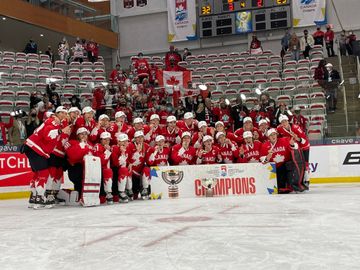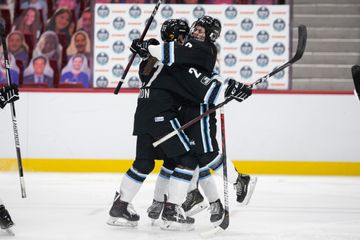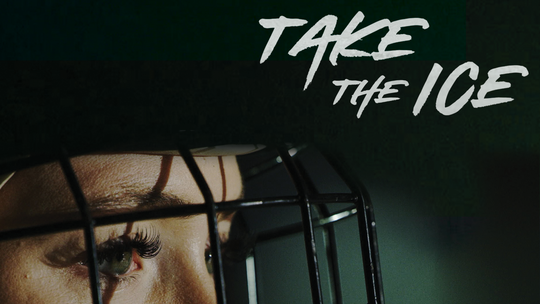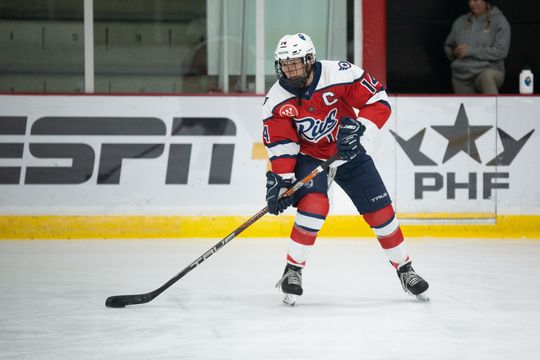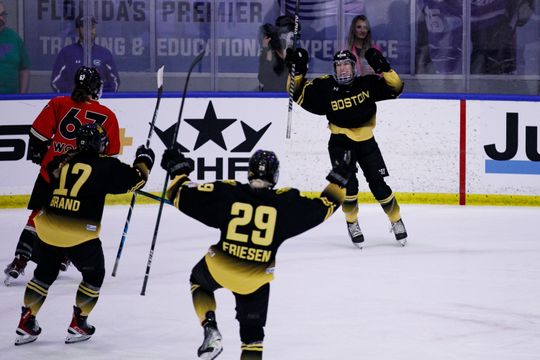The National Women's Hockey League is rebranding ahead of its seventh season. The former NWHL will be known as the Premier Hockey Federation, or PHF for short. The organization announced the change on Tuesday morning and also unveiled its refreshed logo.
According to commissioner Ty Tumminia, the rebranding ushers in a new era as the federation hopes to recognize its athletes based on "their abilities, and to be empowered as equals in sport." Rather than drawing the focus to their gender, the new moniker aims to highlight the athletes and their skill and talent. Instead of being "great women hockey players," they're "great hockey players."
Here's what the federation's press release says inspired the rebranding:
"The PHF name was inspired by empowerment, gender equity and inclusivity with respect to differences in the gender identity of current athletes, prospective players, and league stakeholders. Expansion across the United States, into Canada, and the increase of international talent also helped pave the way for a rebrand with global appeal."
In this regard, the National Women's Hockey League moniker wasn't exactly welcoming to athletes who are transgender or non-binary, as Harrison Browne pointed out on Twitter. The new name is non-gendered and could be the first important step in a chain of moves to be more inclusive.
A critical next step in improving the federation's inclusivity would be to update its transgender player policy. The current policy claims to recognize all forms of gender expression, but does not permit its athletes to take testosterone hormone therapy and allows for testing of athletes who have transitioned. If this rebranding is a genuine attempt at inclusivity, revamping the policy is a necessary next step. The policy, which was implemented in the 2016-17 season, perpetuates the false and damaging narrative that trans people gain significant competitive advantages by undergoing necessary hormone therapy. While the organization is touting its rebrand as "No Labels, No Limits" and a step towards gender inclusivity, the press release focused heavily on "uplifting" cis women in its language and did not address the fact that the federation does in fact place limits on athletes' hormone levels if they are trans.
Rebranding for global appeal and to showcase the federation's international talent certainly makes sense, too. The "National" Women's Hockey League expanded into Canada with the introduction of the Toronto Six, and a team in Montreal is coming within a few years, too. The current iteration of team rosters only has a very small percentage of international players, and 94.4 percent of those signed to date are North American. (The National Hockey League, as the highest level men's league in North America, also has teams in both the United States and Canada.)
In large part, the rebrand reflects the significant personnel and general overhaul the PHF has seen in the past year and a half.
Dani Rylan Kearney, who founded the NWHL, is long gone, with Tumminia named interim commissioner last April and taking the title officially last month. Miles Arnone and the Boyntons are playing much heavier roles in the administrative & ownership side of things. Instead of just the Founding Four, there are six teams, with an additional (Montreal) to come soon. Independent ownership is now running each of the teams, although the same ownership group is managing three of the six. There are a handful of new faces in management and coaching positions.
With so many changes, the timing for a total brand overhaul could make sense, but something about it feels off.
The efforts that Rylan Kearney and countless others over the last six-plus years made to build the NWHL as a recognizable brand have essentially been tossed out of the window. Just months after making its American TV debut on NBC Sports Network and securing several prominent sponsors, the federation is completely overhauling its identity.
In any world, a rebrand isn't the easiest thing to pull off. While this offers a fresh start and shifts the focus to the present (and future), it's important that the NWHL's past not be forgotten or erased, either. Preserving the history is important, and while it sounds like a small thing, ensuring that player and team statistics, game records, etc. all get shifted over to a new website domain is critical. We already lost some of the historical data when they moved from their original website at NWHL.co to the current NWHL.zone, and hopefully that will not happen again.
A rebrand, of course, doesn't address or remedy many of the federation's problems. While the rebrand claims to focus on the future, there are still many outstanding issues. Digit Murphy remains with the Toronto Six despite her previous association with a transphobic organization, and the team and federation haven't done much to actively work for trans rights. (As I already mentioned, the federation also needs to completely revamp its transgender policy.) The incident with Barstool during Lake Placid was not addressed publicly in any meaningful way. The players' association still needs a new head. The federation's new head of US scouting, Bill Flanagan, is – or was – a COVID denier. And while the salary cap may have doubled, players still don't earn a living wage, which also makes it more challenging for international players to come to North America to play in the federation.
In many ways, the PHF's rebrand could a first step. What happens next, and where the federation goes from here, is something to keep an eye on. Although the name is certainly more welcoming to transgender and non-binary players, there is still work to be done. While the name helps shift focus from professional women athletes to simply professional athletes of any gender, there are more steps the federation can take to treat its athletes like professionals, period – and it's those steps, not just the name or the brand identity, that matter most and should be our focus as we move forward into covering the Premier Hockey Federation.


